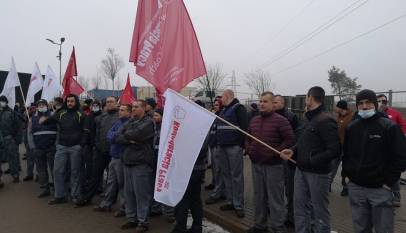
The left-wing party filed a notice with the prosecutor’s office that minister Michał Woś (Solidarna Polska) may have committed a crime. The man Zbigniew Ziobra allegedly spent the funds from the Justice Fund contrary to their purpose. Namely, for the purchase of spying equipment.
The Justice Fund is one of Zbigniew Ziobra’s main political tools. It was intended that the resources from the CF would go to victims of crime and activities to prevent criminal acts. In practice, they also serve propaganda purposes – venomously ideological articles in pro-government titles are financed from it. Now we have learned that the infamous Pegasus, used by the secret service to wiretap opposition politicians and judicial employees, was also purchased with money from the Fund.
In recent weeks, Minister Woś, answering journalists’ questions, has been playing dumb at best, explaining that he has no idea what Pegasus is or whether the Polish secret service has one. On January 3, „Gazeta Wyborcza” revealed that he was the one in charge of the operation to purchase surveillance equipment from the Israelis. Then Woś changed his narrative, arguing that the whole transaction was carried out in accordance with the purpose and idea of the Justice Fund.
Meanwhile, according to the Supreme Audit Office, the operation to purchase Pegasus was illegal.
„The magic barrier of 100,000 employed police officers has just been crossed. As of December 31, 2021, 100,557 police officers are currently serving in the Polish Police.” This is a record number” boasts the Polish police.
It is an absolute record, and the trend is still upward. In 2021, more than 2,500 more officers took up a job in the police force than left it. Despite the pandemic and, according to the police, high demands, more and more people want to pursue careers in the service. In the year 2021, nearly 7,000 new officers began work.
https://strajk.eu/panstwo-policyjne-rosnie-w-sile-rekordowa-liczba-funkcjonariuszy-w-sluzbach/
The state of emergency which was in force on the Polish-Belarusian border has ended. However, this does not mean that life and functioning of the region returned to normal. As of December 1, the ban on staying in the same area, which was under the state of emergency for three months, is in force.
The residency ban is to be in effect from December 1, 2021 to March 1, 2022 and was introduced without media publicity through an ordinance. The amendment relates to the Act on State Border Protection, which was signed by President Andrzej Duda on 30.11.2021.
The Ministry of Internal Affairs, after consulting with the chief of the Border Guard, has the right on this basis to introduce a ban on staying in the border zone, „particularly vulnerable”. Government propaganda tries to maintain the policy of fear of migrants, despite the fact that so far not a single case of aggression of migrants against residents, services or activists has been reported.
According to the Border Group and our informants, the hunger strike has been going on for about a week. In response to dire living conditions, prolonged procedures and de facto imprisonment, a group of about a dozen Afghans and Syrians went on hunger strike. One person collapsed yesterday.
„Under Polish law, people who have experienced violence cannot be held in detention centers. The protesters came to Poland via Belarus, where they were met with violence and inhumane treatment. Their nightmare continues,” the Border Group reported today.
The hunger strike is taking place in building 26, where there is overcrowding, lack of privacy, and poor sanitary conditions. There are currently about 600 people in the center, and they are cared for by one doctor and one psychologist. There is no access to the Internet, which greatly limits or even prevents contact with relatives, family or legal assistance.
https://strajk.eu/strajk-glodowy-w-zamknietym-osrodku-w-wedrzynie/
The indefinite blockade of coal shipment from mines to power plants is practically a foregone conclusion. Subsequent meetings of the miners with the management of the Polish Mining Group did not result in anything. The parties signed a protocol of divergence, and a strike referendum was launched at the mines.
There are two demands of the employees. Firstly, the miners want to be paid for the weekend work they have performed since September last year in connection with increased demand for coal. To date, they have not received any pay for this overtime. Secondly, due to inflation they expect an increase in the average wage in PGG to PLN 8200 gross.
Still on January 13, a delegation of unions is to go for talks with the deputy minister of state assets, Piotr Pyzik, but the activists are not of good opinion. It is hard for them to imagine that the government representative, with whom they have already been negotiating, would suddenly change his mind.
The mood among miners has been additionally worsened by information that mining companies are working on plans to close the mines in Poland faster than it was envisaged in the social agreement signed in 2020. The agreement, which the miners’ unions signed with the government in September 2020, stipulated that the first coal mines would close between 2021 and 2023, but that the last would remain in operation until 2049.
Meanwhile, as Business Insider reported, mining companies have been ordered to develop alternative scenarios in which mines cease operations in 2045 or even 2040. -This does not mean, however, that these options will be pursued. Probably the point is to provide the EC with broader material for analysis and to compare the costs of implementation of various options – says a manager from one of the companies quoted by the portal. According to the unionists, such explanations are simply a fraud.
https://strajk.eu/fiasko-rozmow-w-pgg-wielki-protest-gornikow-juz-pewny-czy-czeka-nas-blackout/
Eventually, three activists: Elżbieta Podleśna, Anna Prus and Joanna Gzyra-Iskand were found not guilty of offending religious feelings by the Court of Appeal in Płock. The sentence is legally binding.
https://strajk.eu/sad-teczowa-maryjka-nie-obraza-a-homofobia-nie-jest-uczuciem-religijnym/
How is the war in Ukraine changing Poland?
The Russian invasion of Ukraine is changing the whole world. Its consequences are felt by …

























